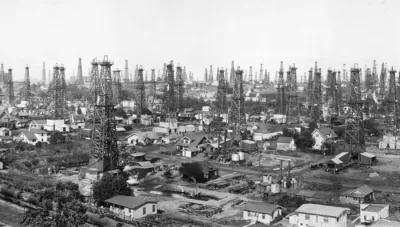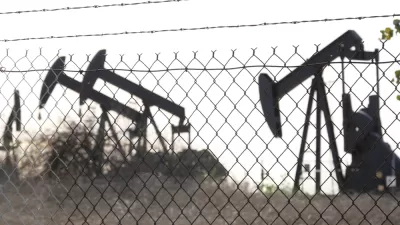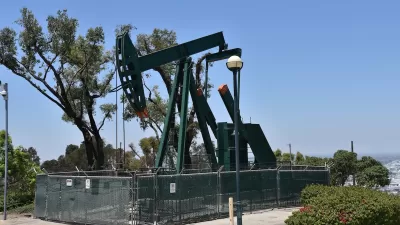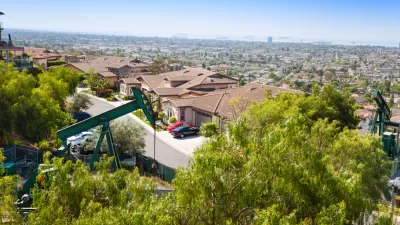Much of California's oil and gas extraction takes place in residential neighborhoods, posing significant health risks to entire communities.

"Every year, upward of 140 million barrels of oil are extracted from the state of California," writes Judith Lewis Mernit for Yale Environment 360. But "unlike more rural oil-producing states, where oilfields might be uninhabited but for the people who work on them, drilling in California happens to a large degree in residential settings."
"In Signal Hill to the south near Long Beach, drilling rigs butt up against playgrounds," while a wall obscures an active oil well just behind the Beverly Center, a posh mall in Los Angeles. "In addition to drilling operations, refineries in the Los Angeles and San Francisco Bay areas, handle some of the dirtiest oil in the world, from Alberta’s Athabasca oil sands to the state’s own carbon-heavy crude," writes Mernit. According to a 2020 analysis by FracTracker Alliance, over 7 million Californians live within a mile of an oil or gas well.
Despite "a mountain of evidence saying that living close to oil and gas wells is harmful to human health," between 2015 and 2020 California "issued more than 25,000 permits for drilling new wells and redrilling older ones, more than 60 percent of them in Spanish-speaking communities." But with "plenty of other culprits for polluted air," the connection is often difficult to prove. A surprising absence of data on the subject "makes it easier for petroleum’s boosters in the state to claim that oil activity does not pose a health hazard for nearby communities, and harder for legislators to protect their constituents from what they insist is making them sick."
Although "Oil industry advocates contend that California has the toughest environmental laws for petroleum extraction in the world," spotty enforcement, low fines, and exemptions for small producers—"the ones in neighborhoods, in people’s backyards"–have led to an unchecked proliferation of wells in residential areas and farms.
In recent years, cities around the country have taken steps to mitigate the impacts of urban oil drilling and limit new wells near homes and schools. "In 2013, the Dallas City Council passed an ordinance prohibiting new drilling within 1,500 feet of sensitive developments," while "[i]n Los Angeles, site of the country’s largest urban oil field, the city council is considering an ordinance to outlaw oil drilling within the city completely." But with oil companies lobbying to block such legislation, advocacy groups express cautious optimism for incremental victories.
FULL STORY: The Oil Well Next Door: California’s Silent Health Hazard

Planetizen Federal Action Tracker
A weekly monitor of how Trump’s orders and actions are impacting planners and planning in America.

Congressman Proposes Bill to Rename DC Metro “Trump Train”
The Make Autorail Great Again Act would withhold federal funding to the system until the Washington Metropolitan Area Transit Authority (WMATA), rebrands as the Washington Metropolitan Authority for Greater Access (WMAGA).

DARTSpace Platform Streamlines Dallas TOD Application Process
The Dallas transit agency hopes a shorter permitting timeline will boost transit-oriented development around rail stations.

Renters Now Outnumber Homeowners in Over 200 US Suburbs
High housing costs in city centers and the new-found flexibility offered by remote work are pushing more renters to suburban areas.

The Tiny, Adorable $7,000 Car Turning Japan Onto EVs
The single seat Mibot charges from a regular plug as quickly as an iPad, and is about half the price of an average EV.

Supreme Court Ruling in Pipeline Case Guts Federal Environmental Law
The decision limits the scope of a federal law that mandates extensive environmental impact reviews of energy, infrastructure, and transportation projects.
Urban Design for Planners 1: Software Tools
This six-course series explores essential urban design concepts using open source software and equips planners with the tools they need to participate fully in the urban design process.
Planning for Universal Design
Learn the tools for implementing Universal Design in planning regulations.
Municipality of Princeton
Roanoke Valley-Alleghany Regional Commission
City of Mt Shasta
City of Camden Redevelopment Agency
City of Astoria
Transportation Research & Education Center (TREC) at Portland State University
US High Speed Rail Association
City of Camden Redevelopment Agency
Municipality of Princeton (NJ)





























